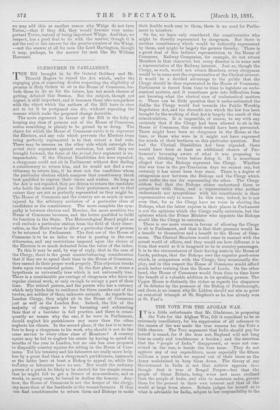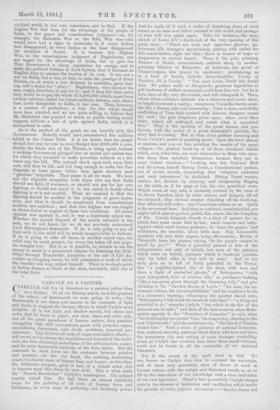THE VOTE FOR THE AFGHAN WAR.
TT is a little unfortunate that Mr. Gladstone, in proposing
the Vote for the Afghan War, felt it expedient to be so extremely conciliatory, for his suppression of all reference to the causes of the war made the true reasons for the Vote a little obscure. The Tory argument that India should pay for herself is sound, for if she does not, England will not long bear so costly and troublesome a burden ; and the assertion that the " people of India " disapproved, or were not con- cerned in the war, is beside the true issue. They do not approve any of our expenditure, more especially the fifteen millions a year which we expend out of their taxes on the Army maintained to keep them down. The theory of our Government in India is not that natives approve it— though that is true of Bengal Proper—but that the people of Great Britain, being wiser and more civilised than the people of India, and able to maintain order, govern them for the present in their own interest and that of the world at large from above. Britain judges for herself as to what is advisable for India, subject to her responsibility to the
civilised world, to her own conscience, and to God. If the Afghan War had been for the advantage of the people of India, in her grave and conscientious judgment—as, for example, the Mahratta War or the Sikh War was—she would have had a right to undertake it, if every Indian had disapproved, as every Indian at the time disapproved the abolition of Suttee. It is because this Afghan War, in the conscientious judgment of Englishmen, was not waged for the advantage of India, but to give the Tory Government a cheap reputation for energy, and to make the political fortune of Lord Lytton, that it becomes an English duty to assume the burden of its cost. It was not a war for India, but a war, at best, to raise the prestige of Great Britain, or, at worst, a war dictated by ambition, party feel- • ing, and a desire for " glory." Englishmen, who allowed the war, ought, therefore, to pay for it ; and if they did, their strict duty would be to pay the whole £13,000,000 which, apart from certain railways, useful for future military defence, and, there- fore, justly chargeable to India, it has cost. That however, is a counsel of perfection ; a vote for the whole would have been rejected, and we are quite willing to believe that Mr. Gladstone has granted as much as public feeling would support, without a sort of spite against India, which it is inexpedient to raise.
As to the method of the grant, we are heartily with the Government. Nobody would have remembered five millions added to the Consol Debt. It is far better that the people should feel year by year in every Budget that £800,000 a year, double the whole cost of the Throne, is being spent because a reckless Government plunged into an unjust and useless war, for which they intended to make powerless subjects at a dis- tance pay the bill. The natural check upon such wars, their cost, will thus be felt, and felt long enough to make two Par- liaments at least pause before they again sanction such " glorious" iniquities. That pause is all we want. We have not the slightest sympathy with those who say that India should not fight, if necessary, or should not pay for her own fighting, or should not leave it to her rulers to decide what fighting is or is not needful. What we contend is that the fighting should be needful in the judgment of grave states- men, and that it should be sanctioned from conscientious motives, not ambition ; and that this Afghan war was fought in direct denial or neglect of those two conditions. All sound opinion was against it, and it was a hopelessly unjust war. Whether the special disposal of the money intended is the best, we do not know, for we do not precisely understand Lord Hartington's statement. If he is only going to pay off Debt with it, the relief will be nearly inappreciable to Indians. If he is going to take off taxes, as another report says, the relief may be much greater, for every tax taken off sets popu- lar energies free. But if, as is possible, he intends to use the money to assist in a permanent scheme for lessening the Debt, either through Terminable Annuities or the sale of Life An- nuities on tempting terms, he will commence a work of which the benefits will long outlast himself. There is no single point in Indian finance so black as the slow, inevitable, tidal rise of the total Debt.



































 Previous page
Previous page